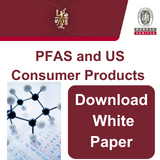PFAS Testing
For US and EU Consumer Products
Per- and poly-fluoroalkyl substances (PFAS) are a group of synthetic chemicals that have been used by some manufacturers and retailers to make consumer products more water, stain, and grease resistant. The more commonly known substances are PFOA (Perfluorooctanoic acid, or C8 (8 carbon chain)), PFOS (Perfluorooctanesulfonic acid, or C8), and PFNA (Perfluorononanoic acid, or C9 (9 carbon chain)). However, there are estimated to be over 9,000 substances in the PFAS family. These chemicals have been found to be hazardous to human health, with high doses linked to reproductive, carcinogenic, and other issues in mammals.
Due to these concerns, regulations on PFAS are emerging. In the U.S., the EPA has issued a non-mandatory health advisory limit for two major PFAS in drinking water: PFOA and PFOS. Some states have set their own stricter limits, and are planning or already have categorized the entire class of PFAS chemicals as hazardous substances. The EU has restricted the use of several PFAS including but not limited to PFOA, PFOS, and C9-C14 Perfluorocarboxylic acids (PFCAs). Apart from these substances, the EU is working on a much boarder restriction of PFAS such as PFHxS and PFHxA.
limits, and are planning or already have categorized the entire class of PFAS chemicals as hazardous substances. The EU has restricted the use of several PFAS including but not limited to PFOA, PFOS, and C9-C14 Perfluorocarboxylic acids (PFCAs). Apart from these substances, the EU is working on a much boarder restriction of PFAS such as PFHxS and PFHxA.
Therefore, brands and retailers that currently use or have previously used PFAS in products or manufacturing processes should be aware and prepared to meet impending regulations. It is important to understand the product testing methods for PFAS and operations that may handle or release PFAS. Doing so can help identify compliance issues and risks that need to be addressed in order to avoid potential lawsuits and damage to brand reputation.
PFAS are well-known for their waterproofing and stain-resistance properties, which are found in a vast array of consumer products including the following but not all:
• Paper and food packaging (pizza cartons, coffee cups, popcorn bags)
• Stain-resistant coatings used on upholstery and fabrics
• Water-resistant clothing (outerwear, sportswear)
• Furniture, outdoor textiles, and associated products
• Cleaning products and spray on fabric treatment
• Cookware
• Rugs and carpets
• Paints, adhesives, varnishes, or sealants
• Electrical Products (cords, microchips)
• Personal care, cosmetics, and hygiene products (oil- and waterproof makeup, lotions)
TYPICAL CLAIMS RELATED TO PFAS
Some common PFAS product and marketing claims related to these properties can be found on product packaging or labels including some of the claims below:
• Stain Resistant/ Repellent/ Proof
• Oil Resistant/ Repellent/ Proof
• Water Resistant/ Repellent/ Proof
• Heat Resistant
• Non-Stick Coating
• Long Lasting (Make-up)
US PFAS LEGISLATION
Over the past few years, U.S. EPA and various U.S. states have started to regulate PFAS in a number of different ways.
Around the industry, groups such as Apparel and Footwear International RSL Management (AFIRM) Group and American Apparel and Footwear Association (AAFA) have expanded the number of PFAS chemicals they include in their Restricted Substances Lists (RSL) and ASTM International is creating a testing guide for the industry.
Brands and retailers selling consumer products in the US market face challenges in complying with a patchwork of state regulations on PFAS chemicals. They must track varying standards, anticipate future federal rules, reformulate products, test new materials, manage supply chains, and increase transparency all while controlling costs. The complexities of navigating this emerging regulatory landscape filled with uncertainties require companies to be proactive and work closely with their supply chain in order to adapt to tighter policies on PFAS.
Stay up-to-date with our Latest PFAS news and updates for US consumer products.
EU PFAS LEGISLATION
The European Union has also started taking actions to regulate per- and polyfluoroalkyl substances (PFAS) chemicals in recent years due to growing health and environmental concerns.
The EU has expanded restrictions on perfluorooctanoic acid (PFOA), perfluorooctane sulfonic acid (PFOS), and related compounds under EU 2019/1021. PFOA and its related compounds have been used as polymerization aids to produce fluoropolymers and are found in non-stick coatings, waterproof fabrics, firefighting foams, and other consumer and industrial products.
The EU has also restricted PFNA in REACH Annex XVII under the restriction for C9-C14 PFCA, which includes PFNA (C9), PFDA (C10), PFUnA (C11), PFDoA (C12), PFTrA (C13) and PFTeA (C14). Besides PFNA, The EU is also proposing to restrict PFHxA and PFHxS in the near future.
Several EU member states including Germany and Sweden have taken more aggressive actions to limit PFAS in products. For example, Sweden has banned PFAS in paper and board for food packaging, firefighting foams, and cosmetics. Germany has also banned PAS in food packaging, firefighting foams, and several other product categories.
Stay up-to-date with our Latest PFAS news and updates for EU consumer products.
BV RECOMMENDED TEST APPROACH
While regulations around per and poly-fluoroalkyl substances (PFAS) in the U.S. and EU markets are complex and frequently changing, BVCPS continues to closely monitor regulatory changes and relevant activities. We have developed customized testing protocols for analyzing PFAS in a range of impacted products and can recommend appropriate tests to Brands and Retailers to meet their specific needs. Moreover, we have the capability to test for many regulated PFAS compounds to support compliance with both U.S. and European standards. You can discuss your compliance needs today with one of our specialists by filling out the form below.

